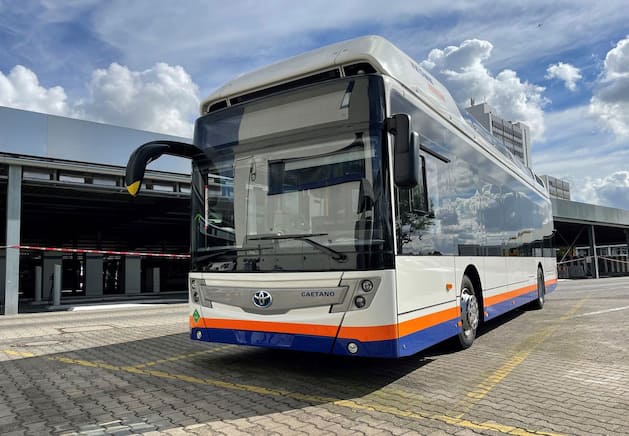Hydrogen is considered a building block for the energy transition – and as a diesel replacement for commercial vehicles. In Wiesbaden, however, this is failing due to reality: the city is buying diesel buses again and will in future be using a mixture of combustion and electric buses.
According to a report by the “Hessischer Rundfunk”, the city of Wiesbaden is getting rid of its fuel cell-powered buses after just one year. This was announced by the municipal transport company ESWE. A conscious decision was made to realign the fleet composition. The city will therefore procure another 36 diesel buses by 2024.
The expensive hydrogen experiment has failed for the time being. “ESWE Verkehr has already entered into a dialogue with all those involved in the hydrogen project in order to discuss how to proceed and to plan the next steps,” the transport company said in a statement.
The transport company has 120 electric buses and 130 diesel vehicles in its depot. Even two drive technologies are “very demanding” given the small amount of space in the depot, Görnemann told the “Hessenschau”. After all, electric buses with battery operation, which are used in many cities throughout Germany, usually do relatively well in reality. Fixed, precisely calculable routes, many options for recuperation when braking and, of course, locally emission-free operation of the buses are among the advantages, while the high purchase price and expensive charging infrastructure are among the disadvantages.
The hydrogen buses, which are also powered by electricity and in which a fuel cell supplies the energy and has to be refueled with hydrogen, are considered to be significantly more complicated and less suitable for everyday use. “In addition, the hydrogen buses are only available on the market with a length of twelve meters and without an articulation,” says Hessischer Rundfunk.
The ESWE buses, both diesel and battery buses, are currently made by Mercedes and MAN. According to the company’s website, the hydrogen buses came from a Portuguese manufacturer, but with a fuel cell system from Toyota.
According to the Hessenschau report, the Hessian Economics Minister Tarek Al-Wazir (Greens) was irritated: “You can’t just withdraw from the project without a word after a good year of operation based on arguments that were already established when it was commissioned,” says Al -Wazir to the Hessian Radio. The hydrogen filling station for the buses was subsidized by taxpayers with one million euros.
Wiesbaden now wants to buy diesel buses again, but replace as many vehicles as possible with electric buses. According to the city, the depot has to be enlarged for this. Because the e-buses require a lot of space because they all have to be charged in parallel.
Safety aspects also play a role. Because of several fires in German bus depots, in which electric buses were either the cause or made the extinguishing work massively more difficult due to dangerous battery fires, many bus operators are taking special safety precautions when loading, according to information from FOCUS Online. This includes keeping the charging vehicle as far away from other buses as possible.
On our e-mobility portal EFAHRER.com you will find all e-vehicles available on the German market
You can also arrange a test drive for the car of your choice free of charge and thus start e-mobility in an uncomplicated manner.
